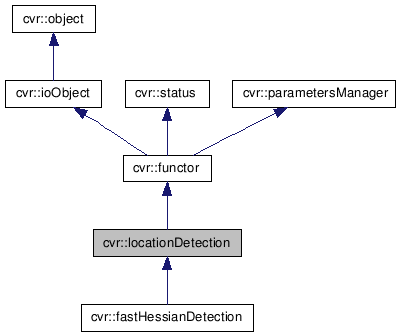

|
last update 20 Sep 2009 |
|
#include <cvrLocationDetection.h>


Classes | |
| class | parameters |
| The parameters for the class locationDetection. More... | |
Public Member Functions | |
| locationDetection () | |
| locationDetection (const locationDetection &other) | |
| virtual | ~locationDetection () |
| virtual bool | apply (const channel8 &src, list< location > &locs) const =0 |
| virtual bool | apply (const channel &src, list< location > &locs) const =0 |
| virtual bool | apply (const channel8 &src, list< location > &locs, int &numLocs) const =0 |
| virtual bool | apply (const channel &src, list< location > &locs, int &numLocs) const =0 |
| virtual const std::string & | name () const =0 |
| virtual locationDetection * | clone () const =0 |
| virtual locationDetection * | newInstance () const =0 |
| locationDetection & | copy (const locationDetection &other) |
| locationDetection & | operator= (const locationDetection &other) |
| const parameters & | getParameters () const |
The location detection abstract class is the parent class of all location detectors in the CVR-Lib.
| cvr::locationDetection::locationDetection | ( | ) |
Default constructor.
| cvr::locationDetection::locationDetection | ( | const locationDetection & | other | ) |
| virtual cvr::locationDetection::~locationDetection | ( | ) | [virtual] |
Destructor.
| virtual bool cvr::locationDetection::apply | ( | const channel & | src, | |
| list< location > & | locs, | |||
| int & | numLocs | |||
| ) | const [pure virtual] |
Compute the locations based on the determinant of the "fast Hessian" matrix.
This method provides numLocs = locs.size() directly. The reason is simple: speed. The size() method needs to count the elements, and this is usually done in the process.
| src | channel8 with the source image. | |
| locs | lists of detected locations. | |
| numLocs | number of locations detected. |
Implemented in cvr::fastHessianDetection.
| virtual bool cvr::locationDetection::apply | ( | const channel8 & | src, | |
| list< location > & | locs, | |||
| int & | numLocs | |||
| ) | const [pure virtual] |
Compute the locations based on the determinant of the "fast Hessian" matrix.
This method provides numLocs = locs.size() directly. The reason is simple: speed. The size() method needs to count the elements, and this is usually done in the process.
| src | channel8 with the source image. | |
| locs | lists of detected locations. | |
| numLocs | number of locations detected. |
Implemented in cvr::fastHessianDetection.
| virtual bool cvr::locationDetection::apply | ( | const channel & | src, | |
| list< location > & | locs | |||
| ) | const [pure virtual] |
Compute the locations based on the determinant of the "fast Hessian" matrix.
Implemented in cvr::fastHessianDetection.
| virtual bool cvr::locationDetection::apply | ( | const channel8 & | src, | |
| list< location > & | locs | |||
| ) | const [pure virtual] |
Compute the locations based on the determinant of the "fast Hessian" matrix.
Implemented in cvr::fastHessianDetection.
| virtual locationDetection* cvr::locationDetection::clone | ( | ) | const [pure virtual] |
Returns a pointer to a clone of this functor.
Implements cvr::functor.
Implemented in cvr::fastHessianDetection.
| locationDetection& cvr::locationDetection::copy | ( | const locationDetection & | other | ) |
Copy member.
| const parameters& cvr::locationDetection::getParameters | ( | ) | const |
Returns used parameters.
Reimplemented from cvr::parametersManager.
Reimplemented in cvr::fastHessianDetection.
| virtual const std::string& cvr::locationDetection::name | ( | ) | const [pure virtual] |
Returns the complete name of the functor class.
Implements cvr::functor.
Implemented in cvr::fastHessianDetection.
| virtual locationDetection* cvr::locationDetection::newInstance | ( | ) | const [pure virtual] |
Returns a pointer to a new instance of this functor.
Implements cvr::functor.
Implemented in cvr::fastHessianDetection.
| locationDetection& cvr::locationDetection::operator= | ( | const locationDetection & | other | ) |
Alias for copy member.